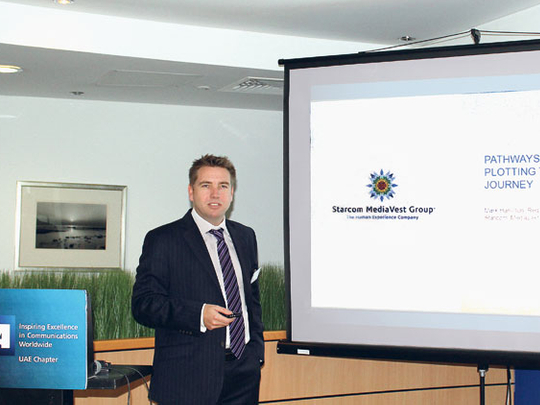
Dubai: In the ever-changing digital world, marketers in the Middle East really need to step up their game and jump aboard the digital boat, experts in the marketing and advertising industry said yesterday during a seminar held by the International Advertising Association (IAA) UAE Chapter in Dubai.
Consumer behaviour has changed so drastically over the past few years that the conventional ways of advertising are no longer working, said Rami Sa'ad, director of Emerging Technologies, Publicis Groupe Media, a global advertising and communications company.
"The path to purchase no longer involves advertising to one million people and then hoping that 100 of them are interested in buying your product," Sa'ad told Gulf News. "It's actually addressing those 100 people with concentration and making sure you're open to feedback and hear what people have to say."
With more people going online and getting on the different social networks, the first thing that a brand needs to have today is an online presence.
"It's like walking into the store and finding the cash counter. Consumers expect something from you and that is to Google you and find you," Sa'ad said. "You need to at least be searchable. Don't jump onto step five and try to build an iPad application."
In July 2009, the number of people who were checking their social networking sites overtook the number of people checking their e-mails, Sa'ad said.
Getting basics right
"More people are using these networks and it's not stopping anytime soon. Whether you love it or hate it, social networking is here to stay."
You don't have to wait for technology to hit your market, Sa'ad said. "Just kick in with whatever application development is required in your own ecosystem."
Another important step is allowing people to give as much feedback as possible, Sa'ad said. Today, a lot of consumer satisfaction is built around manufacturers' ability to allow people to express their opinion about the brand and ask questions.
"It's starting to become more and more obvious that people expect this stuff because everyone is walking around with a BlackBerry or an iPhone and now the [internet] penetration in the UAE is skyrocketing," he said.
The digital world gives the brand the insight for which companies usually spend millions of dollars, he said. "Why research 2,000 people when you can get in touch with people who are actually buying your brand? Aren't they the most important people?"
Mark Hamilton, planning director at Starcom MediaVest Group (Mena), a media planning company, described the status of marketers in the Middle East as not being "in sync with consumers".
Because consumer behaviour is evolving in terms of expectations they have about products, there is a realisation among consumers that the brands they once liked are no longer as dear to them as they used to be, he said. The problem here is brands are reacting slowly to this change, he said.
"The days of just advertising and expecting the consumer to pick up the product and be loyal to the brand is out the window," Hamilton said. "Consumers are looking for an experience."
You can no longer promise what you can't deliver, he said. "If a customer has a bad experience with a product, they actually have a massive influence on that product with somebody who hasn't even seen your product."
For example, when travellers pick a tourist destination, the first thing they do is check the recommended airlines, the recommended accommodation and even recommended dining places online, Hamilton said.
Bad review
"So someone who stayed at that hotel two years ago and who lives two continents away is more likely to influence your decision about where you will stay than anyone else," Hamilton said. "Because who would go out of their way to write a bad review unless they really had a bad experience?"
Rishi Saxena, associate research director at Publicis Groupe Media, said that while consumers' needs have not changed, the way they are manifested has. "It's no longer about the selling of a product or a service, but rather about selling a promise or an experience to the consumers," Saxena said.
Canon did exactly that when its presence in the Australian market was no longer as competitive it once was. The company introduced EOS Photochains, an interactive photography campaign with a simple idea. A person takes a photo and selects a detail which acts as an inspiration for another photographer to shoot and so on. It was a new creative way for people to be inspired, connected with other photographers and, most importantly, be connected to the brand.
As a result, more than 20,000 photos were uploaded to their site from around Australia and Canon EOS rose to a record 67 per cent market share in Australia. It's important for marketers to hold true to their promises, especially at a time when people have the ability to share so much data and information, Saxena said. "We have to ensure that these experiences are true because the consumer is more unforgiving today than ever before. They'll either make you or break you."











